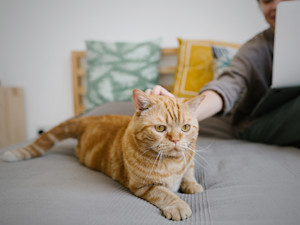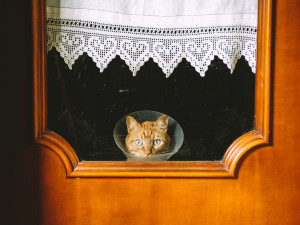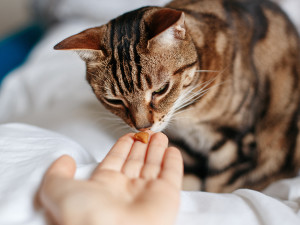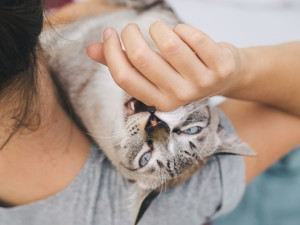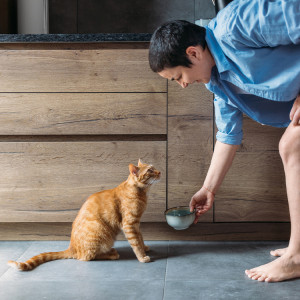How to Identify a Heart Murmur in Cats
And what increases your cat’s risk of developing one.

Share Article
In This Article:
What Is a Heart Murmur In Cats? Symptoms of Heart Murmurs in Cats Causes of Heart Murmurs in Cats Heart Murmur Treatment in Cats
Few of us think much about our hearts. That’s because they usually goes about their jobs, day in and day out.
So, if we’ve thought so little about our own hearts, there’s a decent chance we’ve thought even less about our cats’. We don’t think about it, that is, until something is wrong. One such issue is a heart murmur. This diagnosis can be confusing and scary, so let’s take some of the questions out of it.
What is a heart murmur in cats?
When your vet listens to your cat’s heartbeat, they expect to hear two noises that indicate that blood is flowing as it should through their heart. A healthy heartbeat creates a unique “lub dub” sound: the “lub” is brought about by the closure of the valves that separate the upper atrial chambers of the heart from the lower ventricular chambers, and the “dub” is the sound of the valves to the lungs and the body closing as blood is pumped from the ventricles outward.

Now, if your cat’s heart is producing an extra whooshing sound along with the “lub dub,” it’s called a murmur. This extra sound happens when blood is moving somewhere out of the ordinary when the heart beats and can be due to a number of different changes in either the heart itself or something outside of this all-important organ.
Symptoms of heart murmurs in cats
A little extra noise in the heart isn’t going to make much difference in your cat’s day-to-day life, and you definitely won’t be able to hear it with a naked ear. But, if your cat’s heart murmur is due to a progressive issue with the heart, they may start to show symptoms as things get worse and worse. Signs you may see include:
Weakness, collapse
Weight loss
Decreased appetite
Pale gums
Coughing or wheezing
Exercise intolerance
Stunted growth in kittens
Most mild heart murmurs will be diagnosed by your veterinarian during a routine checkup, but if you notice any of these changes in your cat, see your veterinarian instead of waiting for their next visit.
Causes of heart murmurs in cats
There are a few main causes of heart murmurs in cats, some of which are more serious than others.
Innocent heart murmur
Innocent heart murmurs are merely sounds that tend to show up intermittently. They may occur when a cat’s heart rate is sped up due to stress, or they may happen for a short time while a kitten is growing rapidly. These heart murmurs can’t be heard when the heart rate returns to normal or a kitten will often grow out of it. They tend to be mild and don’t cause any other signs.
Structural heart murmurs
Sometimes the extra noise is due to a structural defect in the heart. In normal blood flow, blood flows from the body into the right atrium, through a valve to the right ventricle through a valve into the lungs, back into the left atrium, through a valve to the left ventricle and then through a valve out into the body. That’s a lot of plumbing within which a problem can arise.
Leakiness in the valves, a thickening or constriction of a valve or vessel, or a hole in any of the chamber walls can contribute to extra noise as blood flows through. Young animals are more likely to experience a heart murmur due to a congenital defect or hole in the walls of the chambers or a mix-up in the blood vessels. Older cats are more likely to develop a cardiomyopathy that causes a leaky valve or other changes in the heart muscle.
Some cat breeds are predisposed to developing heart murmurs as a result of conditions such as hypertrophic cardiomyopathyopens in new tab or dilated cardiomyopathyopens in new tab. So, if you have a Siamese, Persian, Ragdoll, or Maine Coon, make sure you see your vet regularly to stay on top of these potential heart conditions.
Extracardiac murmurs
These are the causes of heart murmurs that are outside the heart’s control, such as anemia or low blood protein caused by blood loss due to an injury or parasites. Hyperthyroidism, heartworms, pregnancy, obesity, high blood pressure, and infections can also be to blame.
Dental infections can lead to heart issues; bacteria from the mouth can set up shop in the heart valves, causing leakiness and murmurs. So, if bad breath isn’t enough of a reason to keep your cat’s mouth clean, heart disease is.
Heart murmur treatment in cats
Listening alone can’t determine if your cat’s extra heart sounds are an innocent finding or due to something more serious. Instead, your vet will need to roll up their diagnostic sleeves and really dive in to understand where this extra noise is coming from and if they should do anything about it.
How heart murmurs are diagnosed in cats
Listening may be useful in determining where the sound is coming from and its intensity, but blood work and imaging are where the diagnosis lies. Blood work will help rule out extra cardiac causes while imaging will help your vet get a look at the heart. X-rays will provide a visual of the heart’s size and check for any lung involvement. An ultrasound of the heart, called an echocardiogram, will provide further information about the heart’s valves, chambers, and vessels.
Treatment for heart murmurs in cats
Diagnosing the cause of the heart murmur is the first step in treatment. That’s because the murmur itself isn’t what’s being treated, but the underlying cause. Cats with innocent heart murmurs typically don’t require any treatment as the murmur will resolve with a reduction in stress or they will grow out of it.
For some cats, treatment means medications and/or a diet change to treat things like hyperthyroidism, high blood pressure, and anemia. Medications and diet may also help some cardiac causes of heart murmurs as well as help manage the output of the heart.
Some congenital causes may require surgery to repair, and causes of heart failure may require medications, oxygen therapy, and fluid removal from the lungs.
When to seek expert help
For most kitties, their heart murmur will be diagnosed by a vet during a routine checkup, so expert help has already been sought so to speak. For other cats, you may not know there’s a problem until things get severe enough to start producing symptoms.
So, if your cat starts showing signs of exercise intolerance, coughing, weight loss, difficulty breathing, pale gums, etc., don’t merely attribute it to aging; see your veterinarian instead. The sooner a heart murmur is diagnosed, the better the outcome for treatment.
References
“Congenital Heart Disorders.” Cornell Feline Health Center. https://www.vet.cornell.edu/departments-centers-and-institutes/cornell-feline-health-center/health-information/feline-health-topics/congenital-heart-disordersopens in new tab.
“Heart Disease-Cats.” Tufts Cummings School of Veterinary Medicine. https://vet.tufts.edu/foster-hospital-small-animals/specialty-services/cardiology/heartsmart/heart-disease-catsopens in new tab.
“Prevalence and Clinical Significance of Heart Murmurs Detected on Cardiac Auscultation in 856 Cats.” Veterinary Sciences. 13 Oct 2022. https://pmc.ncbi.nlm.nih.gov/articles/PMC9611806/opens in new tab.
“When to Worry About Murmurs.” University of Illinois College of Veterinary Medicine. 7 Jul 2020. https://vetmed.illinois.edu/2020/07/07/when-to-worry-about-murmurs/opens in new tab.

Dr. Chyrle Bonk, DVM
Dr. Chyrle Bonk has been a mixed-animal veterinarian since 2010, with a special interest in rehabilitation. When she's not practicing or writing about veterinary medicine, you may find her exploring the outdoors with her family or tending to her cows, horses, chickens, or cats and dogs.
Related articles
![cat with cone after vet visit]()
How Often Should You Take Your Cat to the Vet?
Get thy cat to a vet, even if it’s a struggle to get them out the door.
![cat being offered a treat or vitamin]()
The Best Supplements and Vitamins for Cat Health
Not your mama’s multivitamin.
![cat biting person's hand]()
How to Make Your Cat’s Oral Care as Stress-Free as Possible
Your cat’s oral hygiene is essential to their health. Take things slow and figure out what works best for your kitty’s pearly whites.
![Happy stylish latino queer person looking comfortable on porch steps with gray cat.]()
Cats Lifespan: How Long Do Cats Live? And What to Expect
They are the absolute light of your life. Here’s how you can help them live as close to forever as possible.
![A senior cat is held in their owner's lap]()
How to Care for Your Senior Cat
From taking them to the vet more often to giving them a hand with grooming, older kitties need a little extra TLC.
![Person with short hair putting water bowl on floor for cat]()
How to Get a Cat to Drink Water
Their desert-dwelling roots might resist hydration, but these tricks can help.

